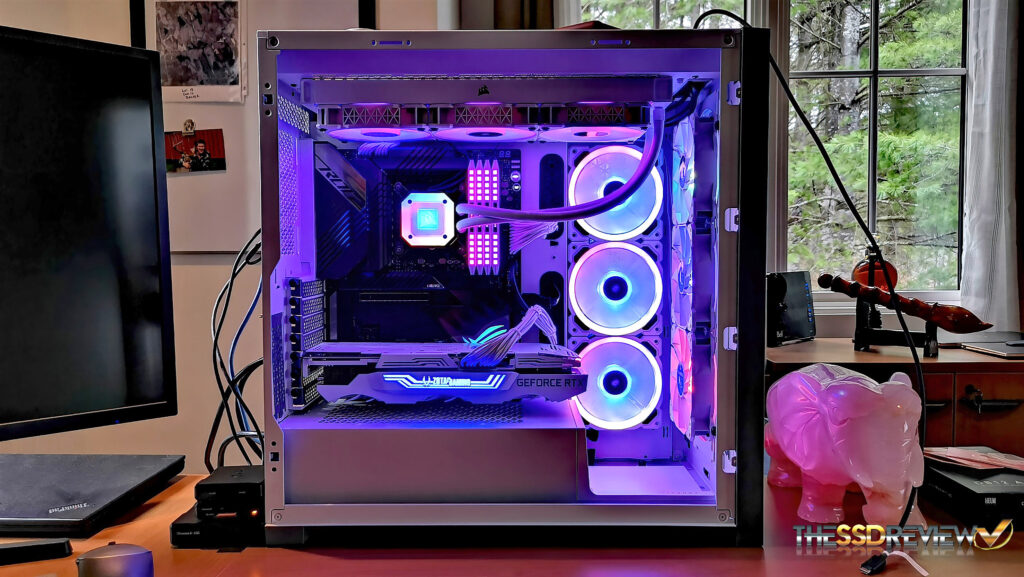TSSDR TEST BENCH AND PROTOCOL
SSD testing at TSSDR differs slightly, depending on whether we are looking at consumer or enterprise storage media. In today’s testing we will be comparing performance of this Phison PS5108-E18 controlled Micron B47R Fortis flash sample SSD on both our Intel and AMD Gen 4 Test Bench PC’s. Both PC’s have been optimized to provide the absolute highest performance available, and have been optimized with our SSD Optimization Guide.
BENCHMARK SOFTWARE
The software in use for today’s analysis is typical of many of our reviews and consists of Crystal Disk Info, ATTO Disk Benchmark, Crystal Disk Mark, AS SSD, Anvil’s Storage Utilities, AJA, TxBench, PCMark 8, PCMark 10, as well as true data testing. Our selection of software allows each to build on the last and to provide validation to results already obtained. At first glance, one might think that AMD has the definite advantage. Watch closely though as we walk you through PCMark as well as True Data Testing, in addition to our typical regimen of benchmark software.
INTEL Z590 PCIe 4.0 TEST BENCH
For this Test Bench, the CPU C-States, Enhanced Intel SpeedStep Technology (EIST) and Intel Speedshift (P-States) have not been disabled. As you will see below, the system is also bumped to 5.3GHz with memory at full speed in its XMP 2 profile.
The components of this Test Bench are detailed below. All hardware is linked for purchase and product sales may be reached by a simple click on the individual item. As well, the title is linked back to the individual build article where performance testing can be validated. Clicking on the Title below will bring you to our complete report on this new Gen 4 PC system.
INTEL Z590 PCIE 4.0 COMPONENTS (Click for System Report)
| PC CHASSIS: | Corsair 5000X RGB White Tempered Glass Chassis |
| MOTHERBOARD: | ASUS ROG Maximus XIII Z590 Hero Gen 4 |
| CPU: | Intel 11th Gen Core i9-11900K |
| CPU COOLER: | Corsair Hydro Series H150i Capellix White |
| POWER SUPPLY: | Corsair RM850x 80Plus White |
| GRAPHICS: | ZOTAC GeForce RTX 3080 Trinity White |
| MEMORY: | Corsair Dominator Platinum RGB DDR4-3200 32GB |
| STORAGE: | Sabrent Rocket 4 Plus Gen 4 4TB NVMe SSD |
| KEYBOARD: | Corsair K70 RGB Mk. 2 SE White Gaming |
| MOUSE: | Corsair M65 RGB Elite FPS Gaming |
| MONITOR: | Samsung 34″ 1440p WQHD Ultrawide Gaming |
ASROCK CREATOR GEN 4 X570 TEST BENCH
Our ASRock X570 Creator Test Bench AMD based and contains the AMD Ryzen 3700x Gen 4 CPU. Our PC has been overclocked from 3600Mhz to 4300MHz and memory has been set at a XMP profile of 2667MHz,
The components of this Test Bench are detailed below. All hardware is linked for purchase and product sales may be reached by a simple click on the individual item. As well, the title is linked back to the individual build article where performance testing can be validated. Tons of credit to this Cougar Blazer Gaming Case paired with Corsair fans and Corsair iCue RGB software which make this our most attractive case to date.
TSSDR ASROCK CREATOR GEN 4 X570 COMPONENTS (link)
| PC CHASSIS: | Cougar Blazer Open Frame Gaming Mid-Tower Case |
| MOTHERBOARD: | ASRock X570 Creator PCIe 4.0 |
| CPU: | AMD Ryzen 3700x |
| CPU COOLER: | Corsair Hydro H150i Pro RGB 360mm Liquid Cooling |
| POWER SUPPLY: | Corsair RM850x 80Plus |
| GRAPHICS: | MSI Armor Mk 2 Radeon RX570 OC |
| MEMORY: | Corsair Vengeance LPX DDR4 3600MHz |
| STORAGE: | Intel Optane 905P 1.5TB SSD |
| KEYBOARD: | Corsair K57 Wireless Gaming |
| MOUSE: | Corsair Dark Core RGB SE Wireless BT Gaming |
| OS | Microsoft Windows 10 Pro 64 Bit |
 The SSD Review The Worlds Dedicated SSD Education and Review Resource |
The SSD Review The Worlds Dedicated SSD Education and Review Resource | 


Any hints on what endurance rating we can expect? (TBW for 2TB model)
Can’t speak for the TBW – that is, warrantied writes – but the endurance on this flash should be quite good. Possibly in the 5K P/E range.
Thanks for jumping in NewMaxx…welcome anytime.
Les, would really like to see you guys adding a detailed thermal performance test for nvme drives. Thanks and keep up the good work.
Abdulaziz.
Pls pls pls, run one of these benchmarks with such modern PCIe 4 drive on “old” PCIe 3.
PCIe 3 should not tamper with those 4K random low QD speeds (but only with the sequential high QD ones) and, if that’s the case, maybe it’s time to consider such PCIe 4 drive for my PCIe 3 laptop. Really, this kind of modern drive is 2.5x faster than good PCIe 3 ones where it matters most.
I’m sorry but why is a site that is solely focused around testing SSDs not including ANY figures or testing regarding power management?
Anandtech does, and their site isn’t focused solely on SSDs